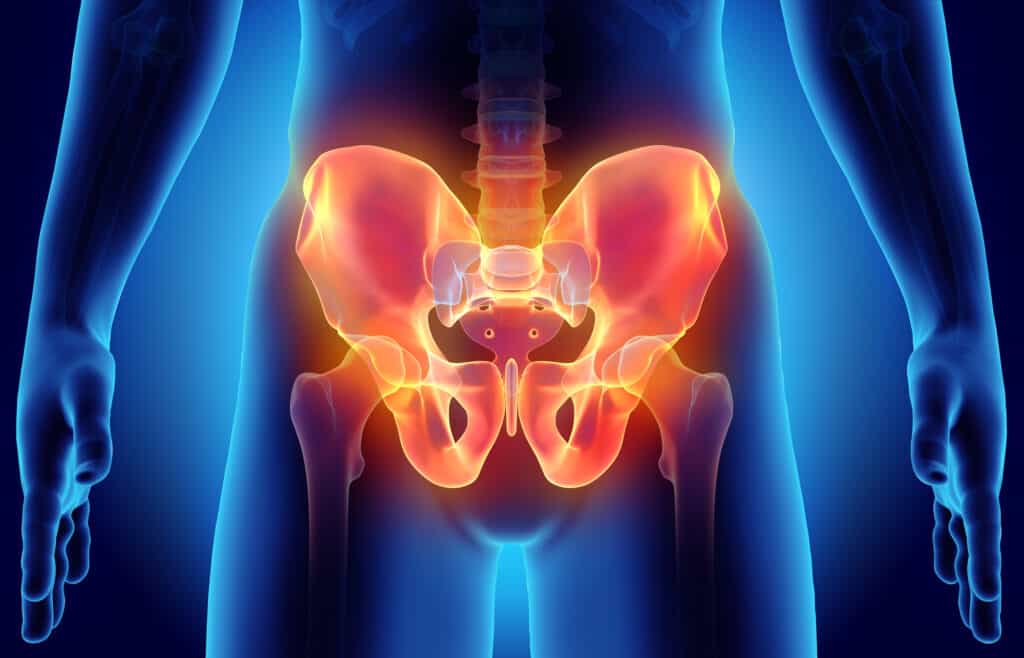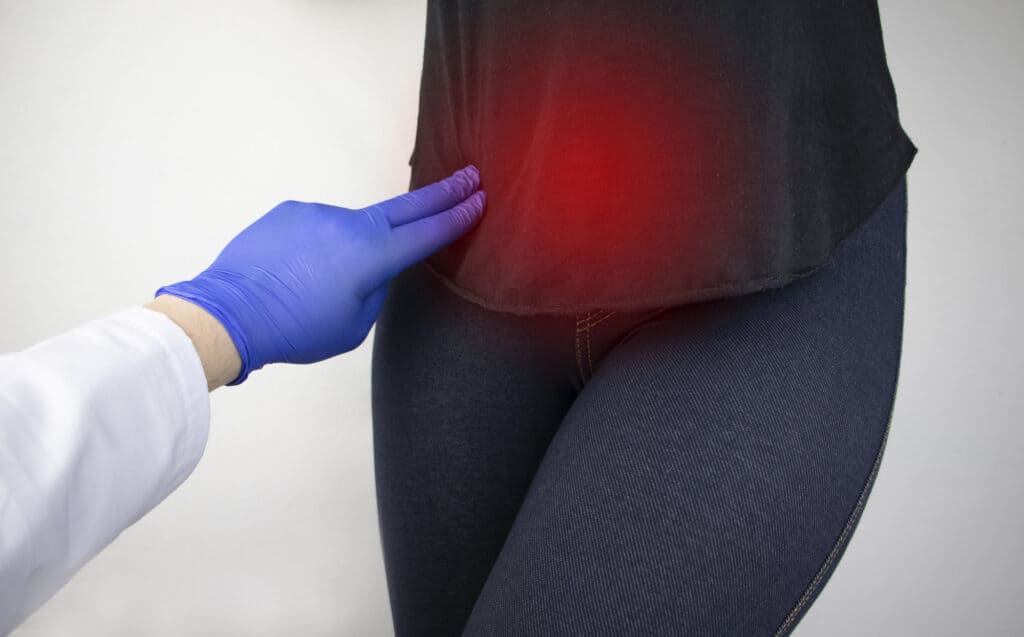
Women who experience issues with a “hypertonic pelvic floor” have pelvic floor muscles in constant contraction.
This contraction causes discomfort and pain, but it can also lead to problems with having sex, bowel and urinary incontinence, as well as many other symptoms.
In addition, the condition can affect all genders and all ages. But the good news is hypertonic pelvic floor muscles are fixable with physical therapy.
In fact, physical therapy with a specialized physical therapist is often the most effective way to treat pelvic floor issues.
More Blogs From Nancy Branberg
What Are The Symptoms Of Pelvic Inflammatory Disease?
What’s Causing My Period Cramps? How Can I Get Help?
What’s Causing My Lower Abdominal Pain?
What Is The “Pelvic Floor”?
Your pelvic floor stretches from your pubic bone to your lower spine. It supports the organs inside your pelvic region.
It holds them in position with ligaments, connective tissue, and the pelvic floor muscles. The muscles and nerves in the pelvic floor also control sexual and urinary function and bowel movements.
The main organs the pelvic floor supports includes:
Unfortunately, pelvic floor issues are common among women of all ages. One of the most common problems is a hypertonic pelvic floor.
What Is A Hypertonic Pelvic Floor?

It might sound like science fiction. But a hypertonic pelvic floor is one of the most common conditions in women who come into the clinic with chronic genitourinary symptoms like urinary stress incontinence or painful sex.
But what does it feel like?
When your pelvic floor is hypertonic, you will likely feel like your pelvic floor muscles are tight all the time, and you may also experience muscle spasms in that area.
These muscle spasms can go on for a long time or happen intermittently. Consequently, your pelvic floor muscles cannot properly relax or control certain essential functions.
As a result, it can lead to pain during sexual intercourse, bowel movements, and urination issues.
What Are The Symptoms Of A Hypertonic Pelvic Floor?
Generally, you will feel pressure inside the pelvic region. You may also have pain there and in the hips or lower back.
Sometimes the pain concentrates in one area, like around the bladder, during sex or bowel movements.
Some other common symptoms of a hypertonic pelvic floor are:
In most women, the symptoms of the hypertonic pelvic floor are mild to begin with, and gradually increase in severity over time.
That's why we recommend early treatment at the first sign of trouble to prevent even greater discomfort and more severe symptoms.
What Causes Hypertonic Pelvic Floor?

The cause of hypertonic pelvic floor is complicated by certain high-risk factors that can make you more likely to develop the condition like:
Suffering any trauma or injury to the pelvic region. Likewise, any damage to this area due to gynecological surgery or during childbirth.
Having a habit of holding back stool or urine due to various reasons. While it is common among kids, adults can sometimes develop the same habit in response to chronic stress.
A history of sexual abuse
High anxiety levels, excessive stress, and depression
Other causes of hypertonic pelvic floor can include:
Is It Hypertonic Pelvic Floor Or Something Else?

The somewhat vague symptoms of hypertonic pelvic floor can indicate other gynecological issues or problems with the bowel or bladder, so it's important to get a proper diagnosis rather than assume.
As experienced women's health specialists, we can usually diagnose hypertonic pelvic floor with a physical evaluation and analysis of your symptoms, combined with taking a detailed medical history.
For example, we ask about your bowel movements, frequency of urination, and sexual history. In some cases, diagnosis may require a detailed examination of the pelvic region, including the contraction and relaxation of your pelvic floor muscles, a vaginal examination to check the pelvic floor, or a digital examination of the anus and rectum.
While it may seem awkward to discuss personal issues so openly and have this examination, it is a necessary part of the diagnosis to pinpoint the cause of your symptoms.
We are painfully aware that there is a lack of safe spaces where women can have honest conversations about these issues with a trained professional.
Too many women endure the discomfort associated with issues like hypertonic pelvic floor, painful sex, or urinary incontinence because of fear of judgment.
At Nancy Branberg Physical Therapy, nothing is taboo. We compassionately help you reconnect with your body and feel good again without pain or shame.
If we can’t diagnose the root cause in the clinic (which is rare), we may recommend that you consult with a physician and consider the following tests:
Defecography:
Doctors perform this test to analyze your bowel movements. They insert a thick paste of barium into the rectum.
You then need to go to the bathroom in a unique toilet for an X-ray. Before the test, you must undergo a colon cleanse to clean your colon and the rectum.
This process involves the insertion of a fine tube with a balloon attached at the end into your rectum. When the balloon inflates, the anus and rectum muscles contract.
Next, the tube is joined to a machine that records the relaxations and contractions to determine sphincter pressure.
Urodynamic tests:
Doctors carry our urodynamic tests to check whether your bladder works properly and how effectively you urinate.
Electromyography:
Involves using electrodes to evaluate the muscles' electrical signals when they contract and relax. The electrodes are fixed to your skin with tape but aren't painful.
There may be additional treatments that can be advised, such as:
In chronic cases where regular treatment is not proving as effective, there might be a need to consult other specialists like:
Treating Hypertonic Pelvic Floor

Like most issues with the pelvic floor – whether the muscles are weak or too tight, you have a prolapse or unidentifiable pelvic pain that causes painful sex, physical therapy is the primary form of treatment for pelvic floor dysfunction.
At Nancy Branberg Physical Therapy, we specialize in pelvic floor dysfunction. After helping you to relax and let go of chronic tension in the pelvic region and the rest of your body, we work with you to retrain and strengthen the pelvic floor muscles to reduce pain and resolve your other symptoms.
Some techniques we use to help with hypertonic pelvic floor specifically include movements to stretch the surrounding joints and muscles and strengthen them.
We also teach you how to relax your abdominal and pelvic floor muscles. In some cases, we may also use biofeedback to demonstrate in real time how to relax and contract your pelvic floor muscles correctly.
How To Prevent Hypertonic Pelvic Floor

Having a healthy, well-functioning pelvic floor contributes to all aspects of women's health and well-being.
You can keep yours healthy by learning how to properly relax and contract the pelvic floor muscles along with the following:
In summary, the good news is that we can successfully treat most issues related to a hypertonic pelvic floor.
However, it may take some time to wholly relieve your symptoms even with regular treatment because you have probably been "holding" your pelvic floor for years if not decades.
In addition, it takes some time to educate the body and your nervous system that you are safe and can let go.
That's why the most important thing you can do for your future health is to start tackling these issues today. Book a free consultation now.


